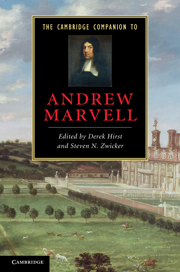Book contents
- Frontmatter
- 1 Introduction
- 2 The social modes of Marvell’s poetry
- 3 Marvell and the literary past
- 4 Borders and transitions in Marvell’s poetry
- 5 Thinking of gender
- 6 Marvell and the designs of art
- 7 Andrew Marvell’s citizenship
- 8 The green Marvell
- 9 A Cromwellian centre?
- 10 The poet’s religion
- 11 Adversarial Marvell
- 12 How to make a biography of Andrew Marvell
- Index
- Cambridge Companions to. . .
9 - A Cromwellian centre?
Published online by Cambridge University Press: 28 March 2011
- Frontmatter
- 1 Introduction
- 2 The social modes of Marvell’s poetry
- 3 Marvell and the literary past
- 4 Borders and transitions in Marvell’s poetry
- 5 Thinking of gender
- 6 Marvell and the designs of art
- 7 Andrew Marvell’s citizenship
- 8 The green Marvell
- 9 A Cromwellian centre?
- 10 The poet’s religion
- 11 Adversarial Marvell
- 12 How to make a biography of Andrew Marvell
- Index
- Cambridge Companions to. . .
Summary
Marvell returned in 1647 from travels in Europe, where he had, according to a later employment reference written by John Milton, learned some Dutch, French, Italian and Spanish. He also learned to fence. In Italy he may also have acquired grounding in political theory, judging by a later allusion to him as ‘a notable English Italo-Machiavillian’. His first recorded action on his return was to sell some property in Cambridgeshire. All told, on his return he may have been well suited for a literary-political career in 1650s Britain.
During the republican decade he found employment first as a tutor working for the scions of powerful men – for Mary Fairfax, daughter of Sir Thomas Fairfax, commander-in-chief of the army in England and Ireland, and subsequently for William Dutton, ward of Lord Protector Oliver Cromwell – then as Latin Secretary to Secretary of State John Thurloe, and finally as MP for Hull. His life trajectory moves from personal associations and perhaps influence, as can be traced in the careful reflection of Fairfax’s own interests, concerns and library in the meditative poem Upon Appleton House, To My Lord Fairfax, to institutional status and authority. His writing during this period observes a more complex pattern. In contrast to the 1660s and 1670s, his literary output involved poetry rather than prose (though it cannot be said with any degree of certainty how many poems he wrote in these years). He is concerned with land and the nation, with political argument, political vocabularies, news, allegiance and loyalty. Yet, for all his pursuit of employment in the republican regime, his poems do not speak in a direct way of commitment or loyalty, or at least of the poet’s commitments.
- Type
- Chapter
- Information
- The Cambridge Companion to Andrew Marvell , pp. 140 - 157Publisher: Cambridge University PressPrint publication year: 2010



